- Home
- Piers Anthony
What Fears Become: An Anthology from The Horror Zine Page 3
What Fears Become: An Anthology from The Horror Zine Read online
Page 3
Marty dragged himself off the pavement and sat against the side of the car. "Good girl, Freya. Good dog." Freya dropped Bast's wrung and punctured corpse in front of Marty and sat down, panting like her master. Marty reached up and scratched the deep pile under the dog's throat. His arms trembled, a nervous reaction to his near-death experience with a house cat, but he'd be okay to drive home if he just gave himself a minute.
Bast was a mess, the cat's tail and hind leg braided together at disturbing angles, its throat mangled, and its innards draped over its wounds like the pulsing bodies of coiled nightcrawlers. Marty watched the heat from the cat's body seep into the spring night air. It smelled like his own rejuvenation and rebirth. Finally he felt strong enough to stand, brush the asphalt off his jeans, call the dog into the car, and put this night behind him. "Come on, Freya."
But the dog was investigating something under the car next to him—the car he had been sitting against. The cat was nowhere to be seen, but there was a track of gore leading from where Bast had been to the underside of that other car, and he could hear an obscene yowling coming from there.
"Freya, get into our car…now!" said Marty, shooing her inside. Jumping into the driver's seat, it wasn't until he pulled onto the highway that he took another breath. "That cat—that damned cat—it still has a couple lives to work through. I don't want to be there when it does."
The lights from the highway rolled over the glass of the windshield and Marty flicked on the radio. Ted Nugent was singing "Cat Scratch Fever" and Marty laughed a laugh out of relief more than amusement. "Hey, Freya, how's that for serendipity?"
When he looked into the rear view mirror, he could see that Freya's ears were flat and her tail was down. Anxiety rimmed the dog's wide eyes.
Marty felt his smile fade under the weight of that stare, dreading the sinister yowl coming from the car's undercarriage—the dead giveaway of a feline stowaway. He checked his gas gauge and calculated in his head how long he could keep the car moving. Not long enough.
About Christian A. Larsen
Christian A. Larsen grew up in Park Ridge, Illinois and graduated from the University of Illinois at Urbana-Champaign. He has worked as a high school English teacher, a radio personality, a newspaper reporter, and a printer's devil. His work has appeared in magazines such as Golden Visions, Lightning Flash, An Electric Tragedy, Eschatology, Indigo Rising, and Aphelion. He lives with his wife and two sons in Kenosha, Wisconsin. http://www.exlibrislarsen.com
DOGLEG
by Bentley Little
I never liked Darla. No reason, really. At least no logical one. It's just that some of your kids' friends you like, and some you don't. As an adult, you can see in the children the seeds of the grownups they are going to be.
And I could see that Darla was going to grow up to be someone I couldn't stand.
But she was Stacy's friend and her mom was June's friend, and I didn't say anything to either of them. She wasn't a Bad Seed or a female Damien or anything, she was just...annoying.
So on those rare occasions when June was out and Darla came over and I was left alone to babysit the two girls, I usually let them do whatever they wanted in Stacy's room or the backyard, while I watched TV and tried to ignore them.
This time was no different. It was a Saturday afternoon and USC was playing—a game I really wanted to see—so when Darla knocked on the screen and asked if Stacy was home, I told her to come on in. Stacy was in her bedroom, and the two of them did something in there for a while before going in the kitchen and snacking on some Goldfish crackers. The game got really exciting, and I lost track of them after that. It wasn't until halftime that I started wondering where they were and what they were doing.
Just at that moment, the back door slammed, and Darla came running into the house. She stopped breathlessly in front of my chair and grabbed my hand. "Mr. Harrison! Come outside! I have to show you something!"
"Why don't you just tell me?"
"No," she whined. "You have to see it! Hurry up! Stacy's waiting!"
Knowing that I should be checking on them anyway, I feigned an interest I did not feel and allowed myself to be dragged out of the house, through the back yard, to the chaotic jumble of boards that Stacy called her "clubhouse." Darla pushed aside the swinging piece of plywood that covered the entrance and went inside. I ducked and followed, entering the makeshift structure's only room.
Blood was everywhere, and at first I did not even understand what I was looking at. I blinked dumbly. There was a dead dog in the left corner, a mutilated Labrador corpse that I recognized as Scout, our next door neighbor's pet. To the right of that, on top of the low coffee table we had scrounged from another neighbor's garbage, was a wiggling form covered by a raggedy, red-soaked cloth. A bloody ax leaned against the wall behind it. My heart started jack-hammering in my chest. Underneath the table, I could see a length of crimson-spattered flesh that looked like a leg.
Darla walked up to the table and pulled aside the cloth. "See what I did, Mr. Harrison? See?"
I did see. Darla had chopped off Stacy's leg above the knee and had somehow grafted the dog's leg in its place. I swooned for a second, felt like fainting, felt like vomiting. The strangest thing—the most horrifying thing, perhaps—was that Stacy seemed to be feeling no pain. She was laughing and excited, and she sat up, then stood, showing off. She was wearing nothing but her underwear, and where the hairy leg of the dog met her own thigh, the transition was smooth, unnoticeable.
Darla was looking up at me, and I wanted to hit her, wanted to smack the neediness and self-satisfaction off her smarmy little face. "Don't you think I did a good job? Huh, Mr. Harrison? Doesn't it look good?"
Stacy took a step forward. The leg screeched when she moved it, a horrible shriek that sounded like bad brakes on an old car. She said something to me, but I couldn't hear it. She could not walk and talk at the same time. The sound of her leg was so loud, she had to stop all movement in order for me to hear her speak.
She did stop, and she looked up at me and smiled. "Isn't it great, Daddy? Darla said she could do it, and she did!" Stacy looked sad for a second. "I didn't think Scout would die, though." Immediately she brightened. "But I love my new leg! It's a lot better than my old one!"
Stacy gestured toward the discarded appendage under the bloody table, and I threw up. I managed to lurch to the left first, and heaved in the corner away from the girls. I wasn't disgusted, exactly, it was just...all of it. The sight, the smell, the sound, Darla, Stacy, the dead dog, the amputated leg, the bloody room, everything was swirling inside me, and my body expressed its emotions by vomiting.
I wiped my mouth on my sleeve. Outside the clubhouse, I heard June's voice, bright and cheerful and entirely clueless, thanking Kristie, Darla's mom, for going shopping with her. Darla immediately ran out of the clubhouse, the plywood door swinging shut behind her. Stacy was shouting excitedly—"Mommy," I think—but she was hurrying after her friend at the same time, and her voice was drowned out by the horrible screech of her leg.
I sucked in a deep breath, then pushed the plywood aside, holding the door open for Stacy, who hobbled through the opening. Her new leg, I noticed, was shorter than her old one, and she listed to the right.
Darla was babbling to her mother, bragging about what she had done. June seemed confused, but she glanced over as Stacy emerged from the clubhouse.
She took one look at her daughter.
And fainted.
June adjusted to it.
I don't know what I expected to happen once my wife came to her senses. A rush to the Emergency Room? A call to the police? But I didn't expect what actually happened: a calm discussion with Darla and her mother that resulted in an understanding. I was the only one screaming and yelling, the only one calling names and making threats, and I would never forgive June for that. Never. But recriminations would have to come later. Right now, I just needed to figure out a way to get my daughter whole again.
Before Kristie and Darla
left, June actually thanked them.
I wanted to hit her.
From down the hall, I could hear Stacy walking around her bedroom, the dogleg screeching.
I walked back there, standing in the hallway and watching her through the open doorway while everyone else said their goodbyes. I remembered what it had been like when my dad had given me a bad haircut. I'd been the laughingstock of the school for an entire week, the object of attention everywhere I went. I could only imagine what it would be like for Stacy, having a dogleg.
She limped from her bed to her closet, from the closet to her dresser, looking down at her hairy leg and grinning all the while. I felt June's hand on my shoulder and nearly jumped. "She'll be fine," June said. "Look how happy she is."
"That's what's so wrong," I explained, but she didn't understand.
It had happened on a Saturday.
Against my better judgment, I called neither the cops nor the paramedics. As June so rationally pointed out, how would I explain what had happened? At the very least, Child Protective Services would take her away from us for observation, until what had happened could be sorted out and dissected. I didn't want that to happen.
That afternoon, I buried Scout in the backyard. I also tried to salvage and clean up Stacy's real leg, but it was dead, shriveled down to the thickness of bone, the skin brown and dry and leathery.
I buried it, too.
All day Sunday, I kept crying, bursting into tears at odd and inappropriate moments. I loved my daughter, had loved her since the moment she'd been born, and it was the little things that set off my emotional fireworks. Remembrance of the past, thoughts of the future. Recalling the times she had run to me when I got home from work, jumping into my arms and hugging me tightly. Wondering what she would do when there were school dances.
And always there was the screeching of the joint where the dogleg was fused right above her knee, a shriek-like squeal that was almost metallic. I heard it every time she moved, a constant reminder of what had happened. Like the telltale heart, it nagged at me, gnawed at me, made me realize that if I had supervised my daughter more closely, if I had watched her play with her friend instead of watching the football game, this never would have happened. She would be a normal little girl, we would be a normal family, and I wouldn't be dealing with this horror.
Finally, I decided to do something about it.
Night had fallen, and both June and Stacy had gone to bed. I was still up, watching TV in the living room, and I walked back to our bedroom, checking to make sure June was asleep. She was. Stacy was asleep, too, in her own room, in her own bed, although she had kicked off part of the covers, and I could see the dogleg sticking out.
I moved forward, bending down to examine it more closely. From even a foot away, the hairy animal appendage appeared to blend into Stacy's smooth white skin, transitioning seamlessly. But from this intimate vantage point, I saw that there was a definite line of demarcation. Reaching out, I touched the dogleg, feeling a strong sense of revulsion as my fingers stroked rough fur.
The dogleg could be amputated. Even if they couldn't reattach her own leg, doctors could affix a prosthetic limb, I told myself. Anything would be better than this...abomination.
Stacy moaned, stirring in her sleep, and the leg joint creaked, its metallic squeak loud enough to be heard on the other side of the house. I felt like throwing up again, but I didn't.
I knew what had to be done.
The previous day, I had cleaned off the ax and returned it to the garage, where Stacy and Darla had originally gotten it. Now I went into the garage and brought the ax back with me to Stacy's room. For a moment, I wasn't sure I'd be able to go through with it, and I put the blade of the ax down on the floor and leaned on the handle like a cane, watching my daughter as she slept. The dogleg was still exposed, and I thought of the girls, so proud of what they'd done, so utterly uncomprehending of the tragic consequences.
Picking up the ax, I chopped off the dogleg with one mighty swing, gratified to hear an ear-splitting screech that came not from my daughter's mouth, but from the joints of the leg itself. There was blood all of a sudden, much more than I would have expected, and I dropped the ax and moved forward to stem the flow, vaguely aware that there was the sound of screaming coming from somewhere behind me. And then—
I was out.
I felt nothing, no pain, at least not until I woke up, and by then Stacy was gone. June had taken her. I ran through the house, my head throbbing where I'd been hit, but their clothes were gone and so were some of Stacy's stuffed animals and a lot of things I couldn't quite recall. I'd apparently been out for some time, because it was light outside, and the clock on the DVD player said it was one forty-five.
Opening the front door of the house, I saw that the car was gone. They'd taken it. But where? To the police station? To June's parents' house? I didn't know, but I started calling. I phoned everyone I knew, dialed every number in our address book, which for some reason June hadn't taken. No one had heard from them, and no one knew where they were.
I decided to wait, hoping they would come back, hoping June would cool off and bring my daughter back to me. But a day passed, a week, and there was still no sign of them.
The only thing left was the dogleg.
It was not part of Stacy, but somehow it was.
It had been left on her bed, right where I'd chopped it off, and that gave me hope. Wherever they were, whatever they were doing, Stacy was free. All of her body parts were her own. That seemed important, somehow.
I prayed that she was still alive, that June had gotten her medical attention, though none of the local hospitals I called would admit to treating anyone matching my daughter's description.
I took the dogleg and put it on ice, in the extra freezer we maintained in the garage. I found myself going out there constantly to check on it, an obsession that only grew worse as the days passed. I would touch the leg sometimes, holding back tears. I even kissed the leg once. It had been a part of Stacy, if only for a little while, and I felt closer to her as I stroked the frozen fur, thinking of how happy she'd been when she'd first jumped off the table and run over with her new leg to give me a hug.
Perhaps I had been wrong to deprive her of it.
"Stacy," I said, sobbing. "Stacy..."
It was the second Sunday after June and Stacy had left, and I was sitting numbly in front of the television, staring at a football game, but not watching it. The doorbell rang, and when I went to answer it, I saw Darla standing on the stoop, looking up at me with bright eyes. "Is Stacy feeling better? Can she come out to play?"
Stacy's not here, I wanted to say, Stacy's gone. But I couldn't get my mouth to say the words.
Darla just stood there, looking at me in a way that made me think she'd known that all along. I started to close the door, but stopped when she said, "I have an idea, Mr. Harrison. Do you want to hear my idea?"
As much as I disliked the girl, hearing her talk was like having a link to my daughter, and I found myself nodding.
Fifteen minutes later, I was in the clubhouse with the dogleg. Darla had gone home to get what she needed and had just returned. She looked at me I nodded, and I laid down on the table. Darla smeared cat food on my leg, spit on the cat food, then pressed a leaf against it. I felt nothing until she started singing. The words were nonsensical, something about dancing birds and bears in the trees, and they were set to the same tune that underlay a lot of children's songs, the one for "Twinkle, Twinkle Little Star" and the ABC's. The second she started singing, there was a tingling in my leg, a weird sensation that was not just skin deep, but went down to the bone.
Was this what Stacy had felt?
Darla smiled at me, and lifted the ax.
"Ready?" she asked.
About Bentley Little
Bentley Little was born in Arizona a month after his mother attended the world premiere of Psycho. He is the author of numerous novels, short stories, articles and essays. He originally came u
p through small presses.
Bentley Little is notorious for not participating in anything on the Internet, so he does not have an official website. The Horror Zine communicates with Bentley Little though mail delivered by the U.S. Post Office.
A BAD STRETCH OF ROAD
by Dean H. Wild
Max Drummond was in the depths of a heavy driver's daze, the toll of endless miles since sunup and too much to think about, he conceded, but for some reason the sight of the interchange rising out of the distance brought him around. He gave his surroundings a waking-dreamer's blink. He was somewhere in the back-forty of the Midwest surrounded by dust devils and afternoon heat shimmers. Other than that, he was uncertain of his location. Someplace where they didn't bother to post highway signs, he could say that much. Not a single directional sign graced the roadside for as far as he could see. Now that he was looking, he noticed not a single billboard advertisement either. Not even a friendly reminder of the local speed limit, only cars racing off the ever-closer interchange ramps at a steady pace, flooding the highway with metal and glass and chrome. On the one hand, he reminded himself how much he hated busy highways, and on the other hand told himself it didn't matter. All that mattered was he make Milwaukee by sundown, reach Linda by nightfall, and cling to the thinly wrapped hope she would open the door when he came knocking unannounced.
Just ahead, an ancient structure—a kind of bridge or trestle—stretched over the highway. He hadn't noticed it at first, but there it was, acting as a gateway to the weave-work of feeder ramps beyond. It held its ground with entitlement like a tribal elder. In fact, its rigid profile struck him as possessing a sort of—well—wisdom. The old bridge would be his starting line, he decided. True, his journey began hours ago in St. Louis, but this would be the point where the agonizing fell away, like stages of a rocket, leaving him light and unburdened. He considered it with a sudden pang of hopefulness. Welcomed it, even.

 Serial
Serial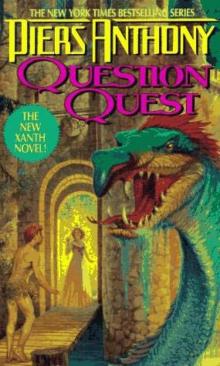 Question Quest
Question Quest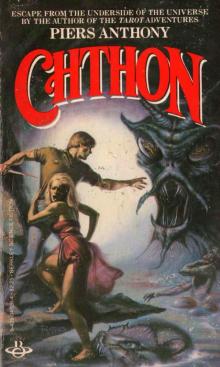 Chthon
Chthon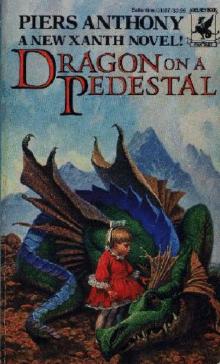 Dragon on a Pedestal
Dragon on a Pedestal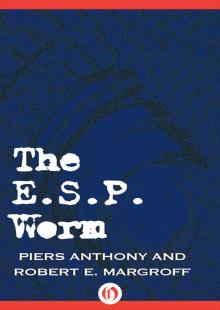 E. S. P. Worm
E. S. P. Worm Hope of Earth
Hope of Earth The Series Boxed Set
The Series Boxed Set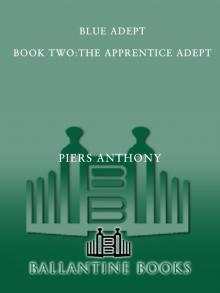 Blue Adept
Blue Adept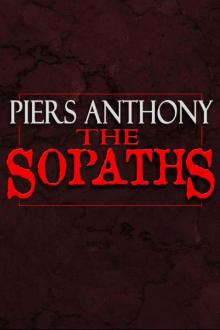 The Sopaths
The Sopaths Beetle Juice
Beetle Juice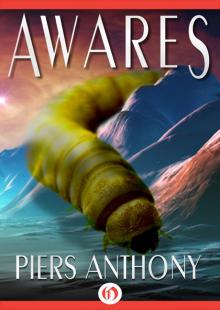 Awares
Awares Golem in the Gears
Golem in the Gears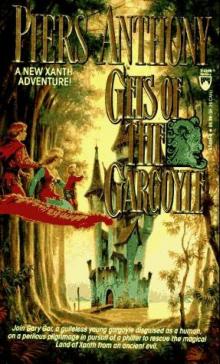 Geis of the Gargoyle
Geis of the Gargoyle Bamboo Bloodbath and Ninja's Revenge
Bamboo Bloodbath and Ninja's Revenge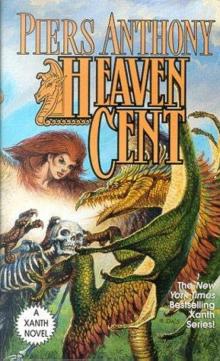 Heaven Cent
Heaven Cent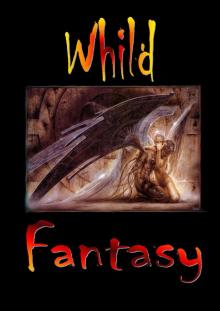 Neq the Sword
Neq the Sword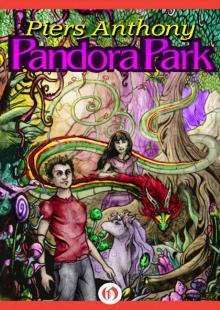 Pandora Park
Pandora Park Juxtaposition
Juxtaposition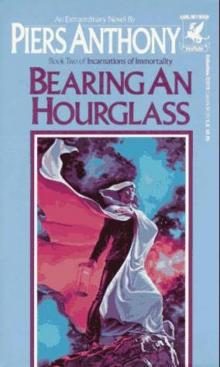 Bearing an Hourglass
Bearing an Hourglass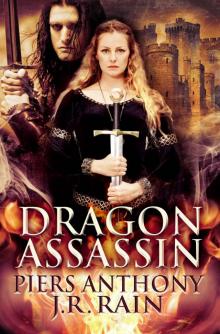 Dragon Assassin
Dragon Assassin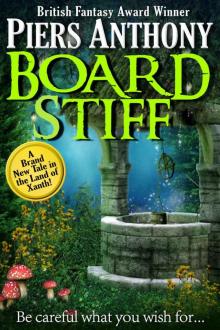 Board Stiff
Board Stiff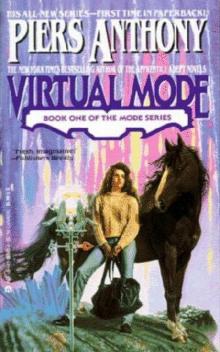 Virtual Mode
Virtual Mode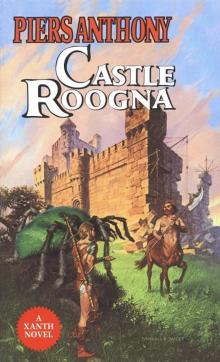 Castle Roogna
Castle Roogna Aliena Too
Aliena Too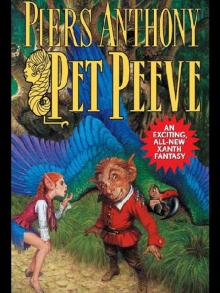 Pet Peeve
Pet Peeve The Metal Maiden Collection
The Metal Maiden Collection Volk
Volk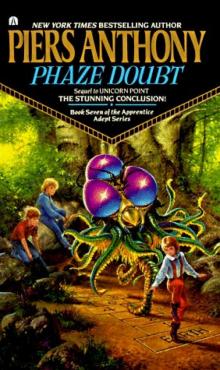 Phaze Doubt
Phaze Doubt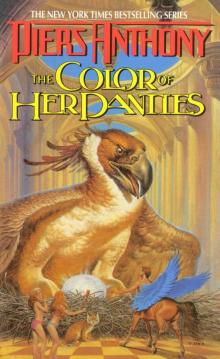 The Color of Her Panties
The Color of Her Panties Amazon Slaughter and Curse of the Ninja Piers Anthony
Amazon Slaughter and Curse of the Ninja Piers Anthony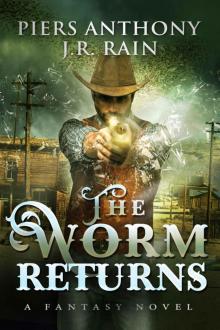 The Worm Returns
The Worm Returns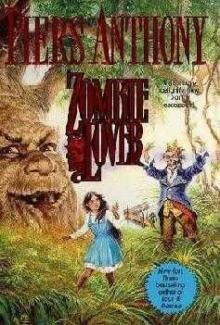 Zombie Lover
Zombie Lover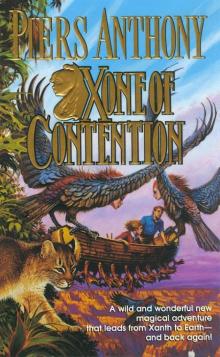 Xone of Contention
Xone of Contention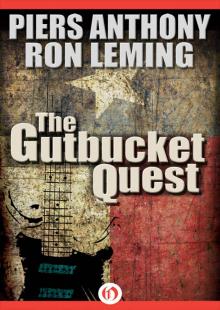 The Gutbucket Quest
The Gutbucket Quest Split Infinity
Split Infinity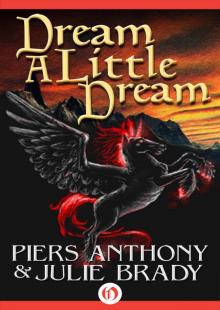 Dream a Little Dream: A Tale of Myth and Moonshine
Dream a Little Dream: A Tale of Myth and Moonshine Balook
Balook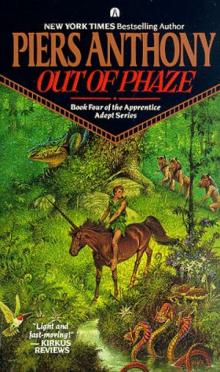 Out of Phaze
Out of Phaze The Secret of Spring
The Secret of Spring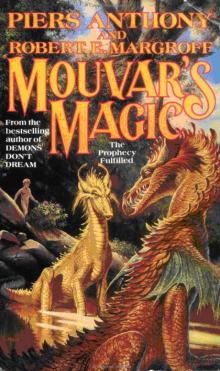 Mouvar's Magic
Mouvar's Magic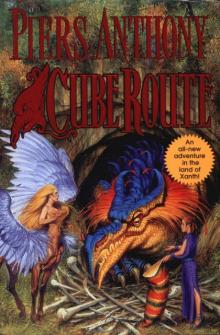 Cube Route
Cube Route Mercenary
Mercenary Total Recall
Total Recall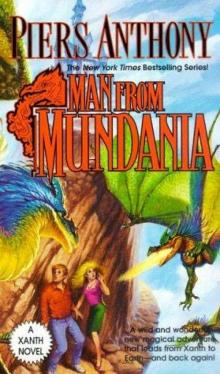 Man From Mundania
Man From Mundania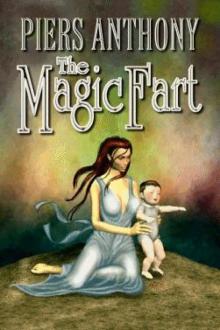 The Magic Fart
The Magic Fart Letters to Jenny
Letters to Jenny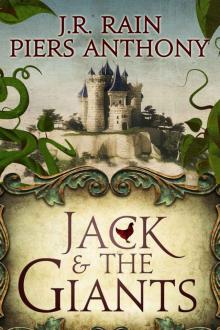 Jack and the Giants
Jack and the Giants Executive
Executive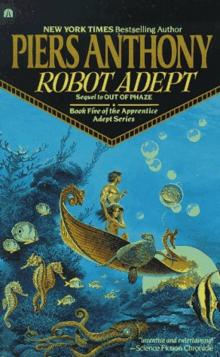 Robot Adept
Robot Adept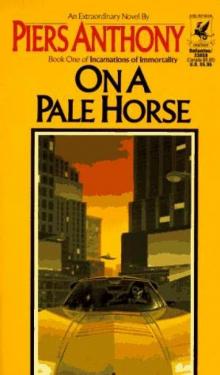 On A Pale Horse
On A Pale Horse Vale of the Vole
Vale of the Vole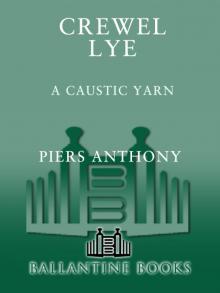 Crewel Lye
Crewel Lye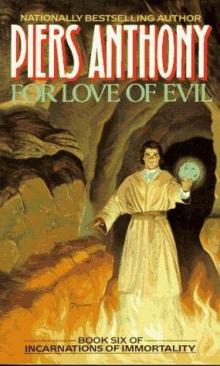 For Love of Evil
For Love of Evil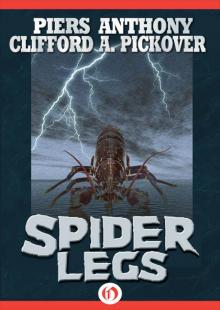 Spider Legs
Spider Legs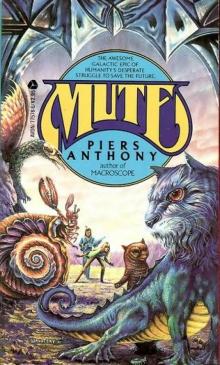 Mute
Mute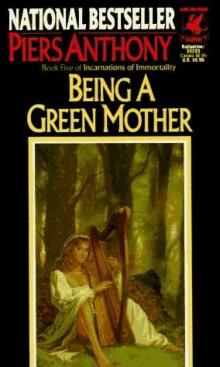 Being a Green Mother
Being a Green Mother Hair Suite
Hair Suite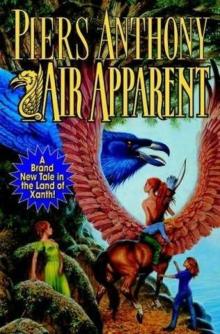 Air Apparent
Air Apparent Politician
Politician Aliena
Aliena Phthor
Phthor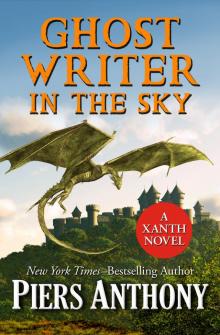 Ghost Writer in the Sky
Ghost Writer in the Sky Pornucopia
Pornucopia Eroma
Eroma Shepherd
Shepherd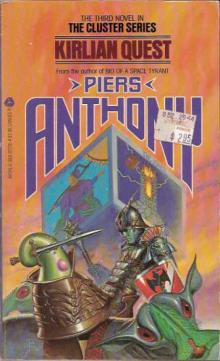 Kirlian Quest
Kirlian Quest Swell Foop
Swell Foop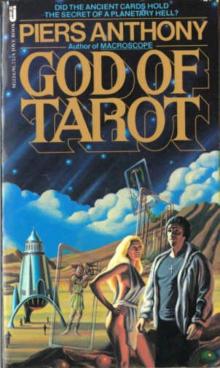 God of Tarot
God of Tarot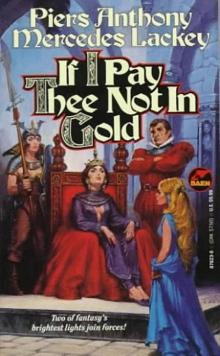 If I Pay Thee Not in Gold
If I Pay Thee Not in Gold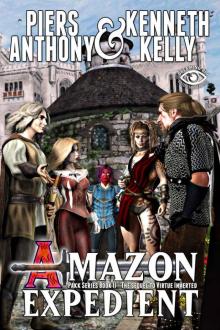 Amazon Expedient
Amazon Expedient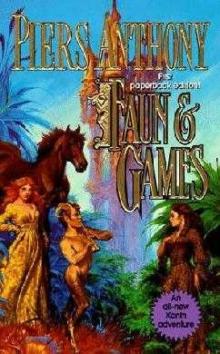 Faun & Games
Faun & Games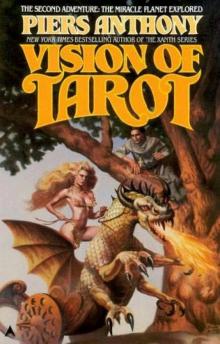 Vision of Tarot
Vision of Tarot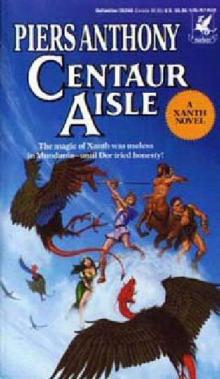 Centaur Aisle
Centaur Aisle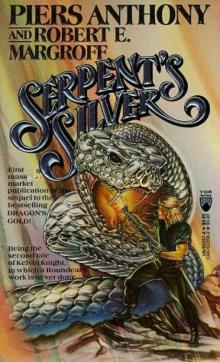 Serpent's Silver
Serpent's Silver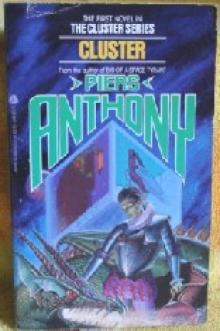 Cluster
Cluster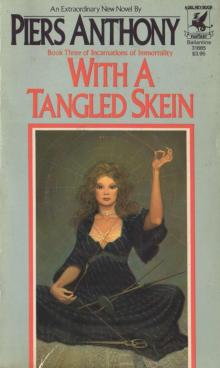 With a Tangled Skein
With a Tangled Skein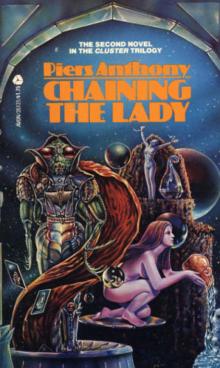 Chaining the Lady
Chaining the Lady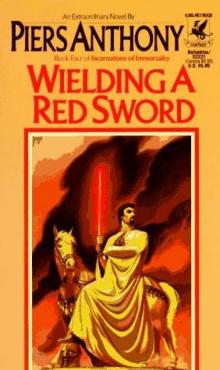 Wielding a Red Sword
Wielding a Red Sword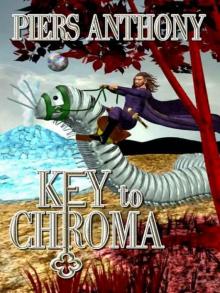 Key to Chroma
Key to Chroma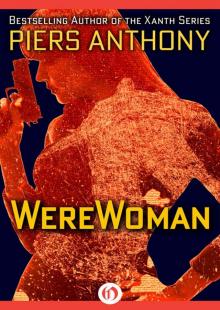 WereWoman
WereWoman Isis Orb
Isis Orb Hair Peace
Hair Peace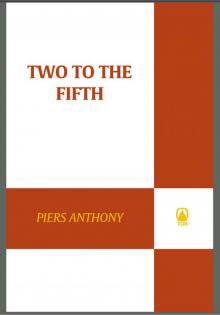 Two to the Fifth
Two to the Fifth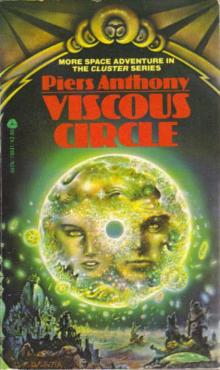 Viscous Circle
Viscous Circle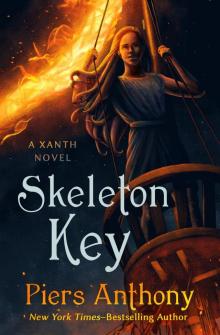 Skeleton Key
Skeleton Key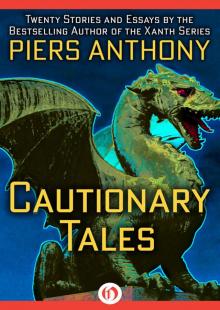 Cautionary Tales
Cautionary Tales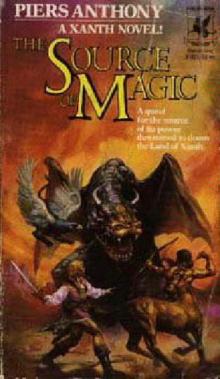 The Source of Magic
The Source of Magic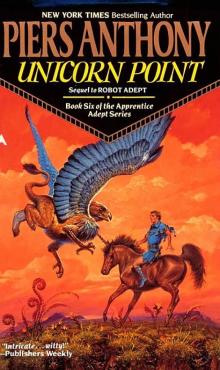 Unicorn Point
Unicorn Point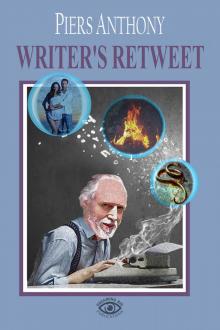 Writer's Retweet
Writer's Retweet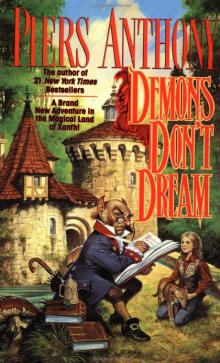 Demons Don't Dream
Demons Don't Dream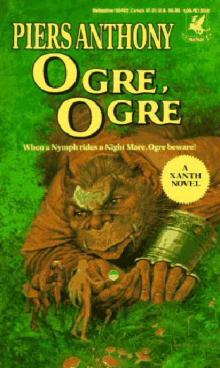 Ogre, Ogre
Ogre, Ogre The Iron Maiden
The Iron Maiden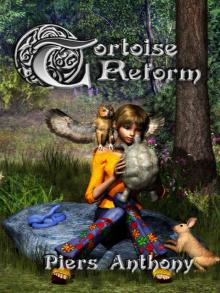 Tortoise Reform
Tortoise Reform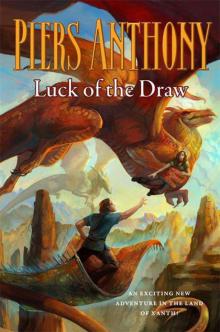 Luck of the Draw
Luck of the Draw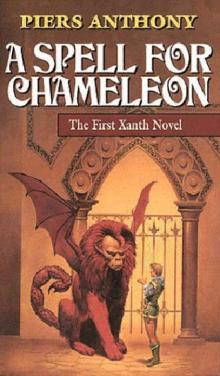 A Spell for Chameleon
A Spell for Chameleon Yon Ill Wind
Yon Ill Wind Currant Events
Currant Events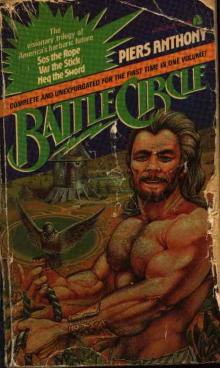 Var the Stick
Var the Stick And Eternity
And Eternity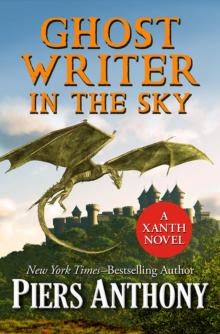 Kiai! & Mistress of Death
Kiai! & Mistress of Death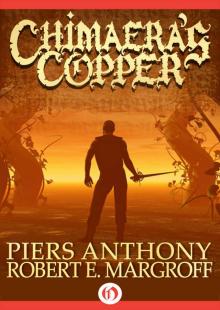 Chimaera's Copper
Chimaera's Copper Refugee
Refugee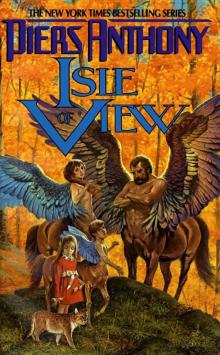 Isle of View
Isle of View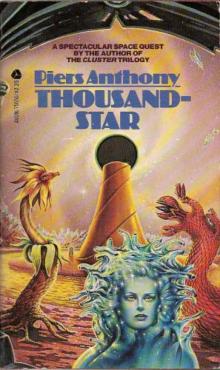 Thousandstar
Thousandstar Mer-Cycle
Mer-Cycle Service Goat
Service Goat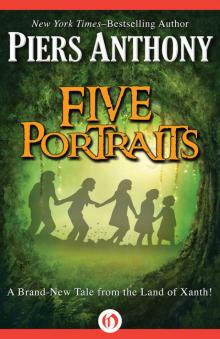 Five Portraits
Five Portraits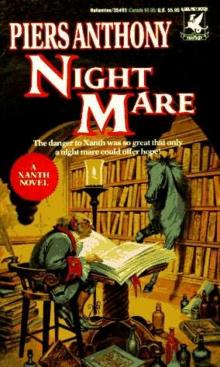 Night Mare
Night Mare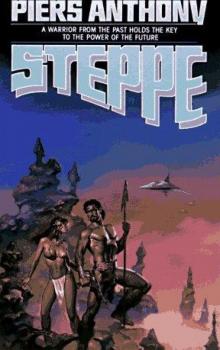 Steppe
Steppe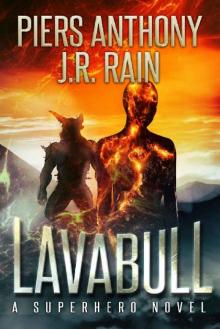 Lavabull
Lavabull Well-Tempered Clavicle
Well-Tempered Clavicle Aladdin Relighted
Aladdin Relighted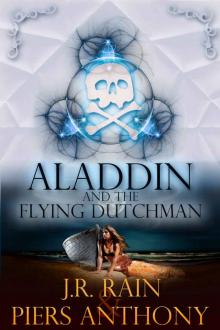 Aladdin and the Flying Dutchman
Aladdin and the Flying Dutchman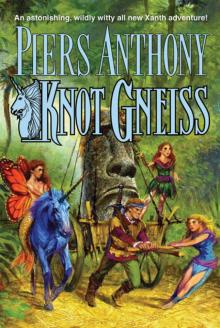 Knot Gneiss
Knot Gneiss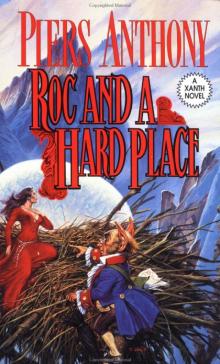 Roc and a Hard Place
Roc and a Hard Place Aladdin Sins Bad
Aladdin Sins Bad Flytrap
Flytrap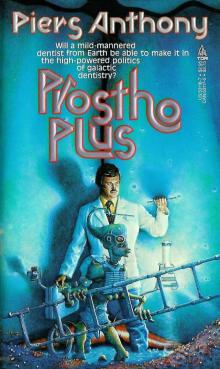 Prostho Plus
Prostho Plus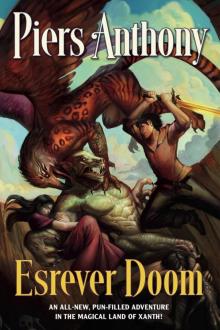 Esrever Doom
Esrever Doom Hair Power
Hair Power The Journey
The Journey Virtue Inverted
Virtue Inverted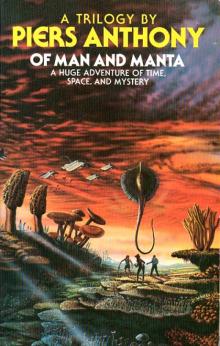 Of Man and Manta Omnibus
Of Man and Manta Omnibus Trail Mix: Amoeba
Trail Mix: Amoeba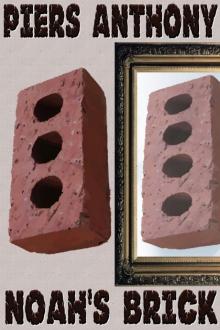 Noah's Brick
Noah's Brick Odd Exam
Odd Exam Magenta Salvation
Magenta Salvation Jest Right
Jest Right Fire Sail
Fire Sail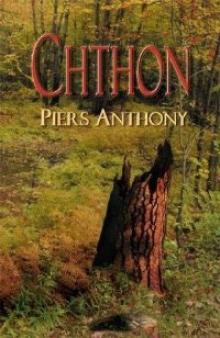 Chthon a-1
Chthon a-1 Amoeba
Amoeba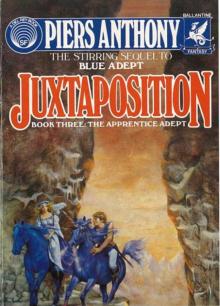 Juxtaposition aa-3
Juxtaposition aa-3 Pira
Pira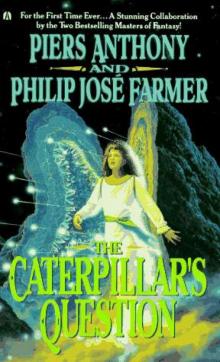 THE CATERPILLARS QUESTION
THE CATERPILLARS QUESTION What Fears Become: An Anthology from The Horror Zine
What Fears Become: An Anthology from The Horror Zine Bio of a Space Tyrant Vol. 3. Politician
Bio of a Space Tyrant Vol. 3. Politician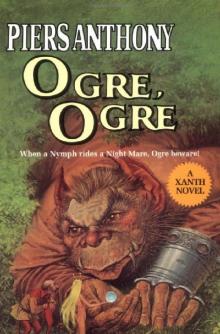 Ogre Ogre x-5
Ogre Ogre x-5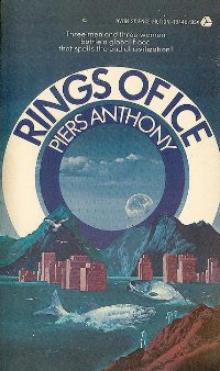 Rings of Ice
Rings of Ice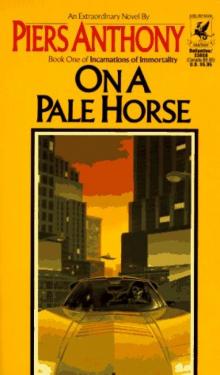 On a Pale Horse ioi-1
On a Pale Horse ioi-1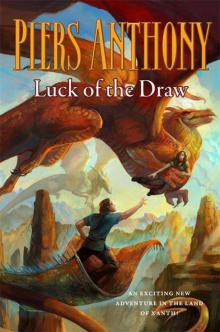 Luck of the Draw (Xanth)
Luck of the Draw (Xanth)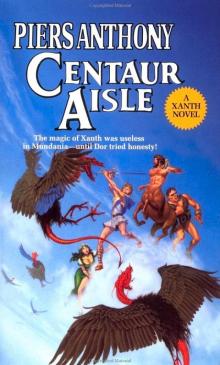 Centaur Aisle x-4
Centaur Aisle x-4 Thousandstar (#4 of the Cluster series)
Thousandstar (#4 of the Cluster series)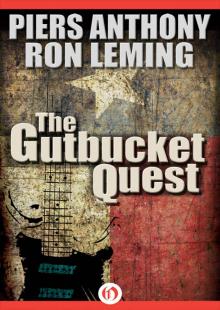 Gutbucket Quest
Gutbucket Quest Isle of Woman (Geodyssey)
Isle of Woman (Geodyssey)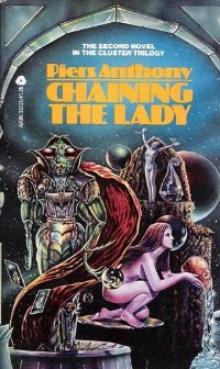 Chaining the Lady c-2
Chaining the Lady c-2 To Be a Woman
To Be a Woman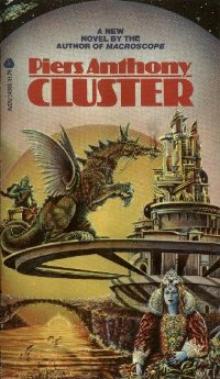 Cluster c-1
Cluster c-1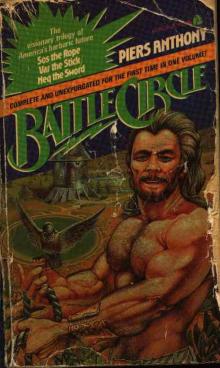 Battle Circle 2 - Var the Stick
Battle Circle 2 - Var the Stick Mercenary (Bio of a Space Tyrant Book 2)
Mercenary (Bio of a Space Tyrant Book 2)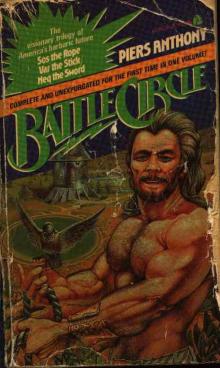 Battle Circle 1 - Sos the Rope
Battle Circle 1 - Sos the Rope Xanth 30 - Stork Naked
Xanth 30 - Stork Naked Secret of Spring
Secret of Spring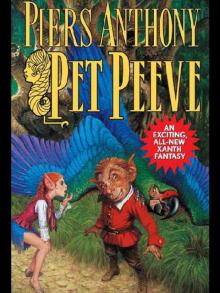 Xanth 29 - Pet Peeve
Xanth 29 - Pet Peeve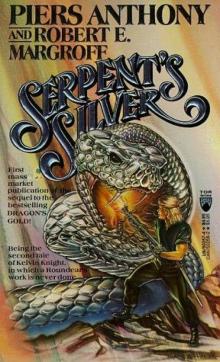 Serpents's Silver
Serpents's Silver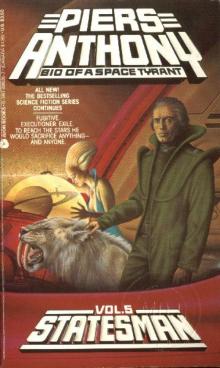 Statesman by Piers Anthony
Statesman by Piers Anthony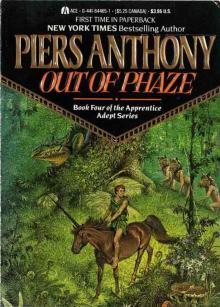 Out of Phaze aa-4
Out of Phaze aa-4 Amazon Slaughter & Curse of the Ninja
Amazon Slaughter & Curse of the Ninja